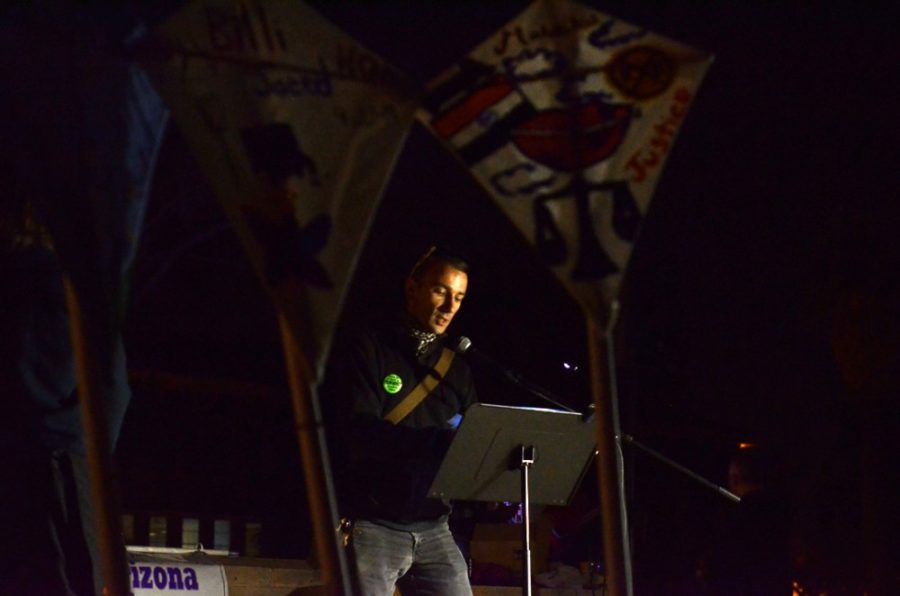Students and members of the Tucson community gathered on Thursday to remember the murders of transgender individuals across the world at the International Transgender Day of Remembrance.
At 6 p.m. around Old Main Fountain, members of the Southern Arizona Gender Alliance hosted a candlelight vigil honoring members of the transgender community that have been killed. The vigil began with the reading of 268 names of transgender people murdered just this past year, said Greg Daniels, co-director of ASUA Pride Alliance.
“That’s just the people that we know of,” Daniels said.
While the ceremony marked a cumulative tragedy of hatred and ignorance, the community support by vigil attendees was evident.
“It’s beautiful in the sense that it evolves organically,” said Chris Sogge, graduate assistant at the office of LGBTQ Affairs. “One person will start reading the names, and after that, people will start collectively doing it. By the end, there’s this group sense of bonding, and grief, and remembrance — this really unique feeling. It’s like starting a fire, so to speak.”
The ceremony was followed by a procession led by members of SAGA, during which procession members flew student-made kites.
“To make a kite, [students] had to attend a workshop to learn more about trans identities and the violence that trans people face,” said AJ Born, co-director of Pride Alliance. “The kites symbolize resiliency in the face of violence and discrimination and are a way to honor transgender lives.”
The procession began at Old Main Fountain and ended at Fluxx Studio & Gallery, where members of the procession gathered for dinner to kindle community spirit.
While the vigil mourned murders that have occurred in the past, it was by no means an indication that violence against transgender people does not occur today.
According to the National Coalition of Anti-Violence Programs’ “2013 Report on Lesbian, Gay, Bisexual, Transgender, Queer and HIV-Affected Hate Violence,” transgender women are amongst people of color and gay men for the highest risk of falling victim to homicide, and also have the highest severity of experiencing violence among those surveyed.
“Almost three-quarters (72%) of homicide victims were transgender women,” the report states, “and more than two-thirds (67%) of homicide victims were transgender women of color.”
The report also states that transgender people of color were six times more likely to experience physical violence from the police than white cisgender survivors of police violence.
Transgender women were “4 times more likely to experience police violence compared to overall survivors” and “6 times more likely to experience physical violence when interacting with the police”; transgender men were “1.6 times more likely to experience violence from the police and 5.2 times more likely to experience physical violence perpetrated by the police.”
These statistics appear no better for transgender people of Southern Arizona.
According to the Wingspan Anti-Violence Project, the percentage of transgender survivors of physical violence who are seeking representation for the crimes committed against them is twice the national average released by the NCAVP.
Patrick Farr, official coordinator of Wingspan’s Anti-Violence Project, said 166 of 351 survivors in the local AVP were cases motivated by bias, classifying them as hate crimes. The end of the report states that none of the hate crimes reported by the AVP have been classified as such by the Tucson Police Department, Farr said.
“For the past 14 months that I’ve worked in the Wingspan Anti-Violence Project,” Farr said, “I haven’t come across an instance of the Tucson Police filing any hate crime.”
Even if TPD had filed these instances as hate crimes, Wingspan’s report states that only 22 percent of those surveyed would have reported a bias-motivated crime to the police due to fears of anti-transgender bias.
The NCAVP report reveals a nation-wide correlation in this data, adding that the “only comparable data to NCAVP’s hate violence report is the ‘Hate Crime Statistics’ report annually released by the FBI’s Criminal Justice Information Services Division,” in which only 13.3 percent of 13,022 law enforcement agencies participating in the report relayed information to the FBI in 2012.
Students can learn more about the transgender community by volunteering at the Southern Arizona AIDS Foundation or by taking the Transgender 101 education course. The next course hosted by Safe Zone will be held on Dec. 5 in the Ventana Room of the Student Union Memorial Center. Registration is available online at lgbtq.arizona.edu/fall-2014-safe-zone-training-schedule.
_______________
Follow Ian Martella on Twitter.
Editor’s Note:
This statement has been changed: ”The vigil began with the reading of 260 names of transgender people murdered just this past year, said Greg Daniels, co-director of ASUA Pride Alliance.”
It is edited to say 268 names instead of 260 names.









